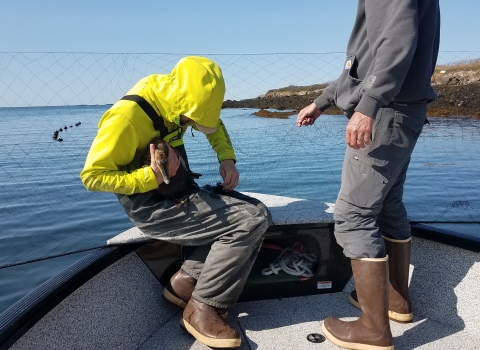Thanks to the proactive work of state and federal law enforcement professionals, an Arkansas-based live fish distributor is no longer illegally transporting and selling nonnative grass carp in Indiana.
Following complaints from concerned parties, we at the U.S. Fish and Wildlife Service worked with conservation officers within the investigation section of the Indiana Department of Natural Resources to investigate and quickly close this case. On February 27, 2017, Arkansas Pondstockers paid two citations in federal court totaling $12,060.
Why stock grass carp?
For two decades Indiana has been enforcing regulations that allow people to use grass carp as a biological control method for aquatic vegetation in man-made ponds. These regulations clearly outline how to use grass carp as an alternative to chemical treatments in a way that keeps these nonnative fish out of rivers and streams and away from Indiana’s native fishery.
Even though sterile grass carp are a good alternative to chemical treatments, they can harm our native fishery by damaging spawning areas and other habitat. They can also outcompete native fish for food which further impacts both the greater ecosystem and recreational opportunities. To lessen the likelihood of these impacts, specific safeguards were written into law. Indiana state law requires two permits for the sale of grass carp, both a fish haulers' permit to transport the live fish and an aquaculture permit to sell grass carp. An important aspect of state law is that fish haulers must deliver live grass carp to the private ponds where the fish will live. The intent of this rule is to keep grass carp out of the public waterways, where they could cause problems for native fish.
Under state law, pond owners who wish to use this biological control method are required to use professional fish stocking businesses that only use certified sterile grass carp, known as triploid grass carp. This ensures that these nonnative fish cannot reproduce if they are to escape man-made ponds. In addition to these safeguards, the state requires fish stocking businesses to report their activities so that biologists can closely monitor the use of grass carp.
These state regulations don’t just benefit Indiana’s fishery, they’re good for business. Using grass carp to control aquatic vegetation is popular in Indiana and business can be competitive. With between 25 to 30 dealers selling thousands of triploid grass carp annually, dealers are motivated to keep each other operating within the law. This ensures fair pricing and open competition.
What makes this a federal case?
We work collaboratively with state and tribal partners across the country to support legal wildlife commerce and hunting opportunities for American hunters, anglers and wildlife-related businesses. In this case, Arkansas Pondstockers was out of compliance with both Indiana state law and an overarching federal law that supports state-level wildlife conservation. The Lacey Act, a federal conservation law which dates back to 1900, protects fish, wildlife and plants both domestically and internationally. Under the Lacey Act, it is unlawful to import, export, sell, acquire, or purchase fish, wildlife or plants that are taken, possessed, transported, or sold: 1) in violation of federal, state, foreign or tribal law, or 2) in interstate or foreign commerce involving any fish, wildlife, or plants taken possessed or sold in violation of State or foreign law.
In this case, employees sold grass carp directly from their truck, without transporting to a private pond. During the joint investigation, we discovered that even though the business had obtained the required permits in the past, they failed to have them at the time the violations occurred and records show that they were out of compliance for several months during 2016.
In addition to paying the federal citations, Arkansas Pondstockers’ most recent aquaculture permit application has been denied by Indiana Department of Natural Resources. This means that the fish hauler will be unable to legally sell triploid grass carp in Indiana for 2017.
Fighting against invasive carp is a collaborative effort. We work with provincial, state, and other federal partners to monitor and control the spread of bighead, silver, grass and black carps in our country's waters.




